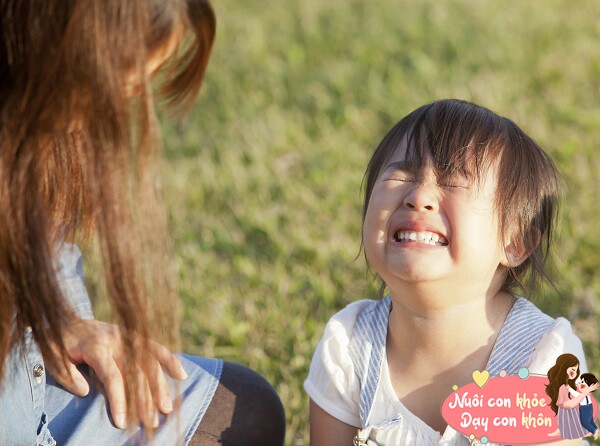However, in reality, children go through three rebellious stages in their lives, and parenting becomes easier if parents understand the psychological needs behind these behaviors.

Instead of scolding your child during these rebellious stages, try communicating with them in a more understanding and effective way.

The Terrible Twos
Children around the age of two will go through their first rebellious stage. There’s even a special term in English for this: “Terrible Twos.”
You may notice that your once gentle and sensitive little angel seems to have transformed into an angry bird overnight. They may throw things, roll on the floor, and frequently say “No” when they’re not happy.
Another common behavior among some toddlers is hitting others. Whether they want to or not, and whether they know it or not, they hit whenever they see someone. Many parents think their two-year-old is simply being unreasonable and often punish them for not listening.
In reality, this is a normal rebellious stage for toddlers. They feel trapped in a “deep hole” and need their parents to pull them out.
According to Dr. Maria Montessori, when children are first born, they have no sense of self and are one with the world. But after turning two, they go through a sensitive period of self-awareness. They can now distinguish between “yours” and “mine,” enjoy saying “no,” insist on doing things independently, and dislike help from others.
The world is vast, and they want to explore it themselves, discovering the unknown with their own hands.
However, due to their lack of ability and emotional control, it’s normal for them to exhibit behaviors like resistance, disobedience, and defiance during this stage.

Here’s how parents can handle this stage:
Be Understanding and Patient
Competing with a rebellious toddler is a sure way to lose. So, it’s essential to be patient and understand their desire to explore and discover the world independently.
Try to listen to some of their requests and not react positively to unreasonable behaviors. You can refuse your child without punishing or verbally attacking them. The period before the age of three is crucial for forming a sense of security.
When your child acts unreasonably, stay calm and say, “I love you, but I don’t like the way you’re behaving.” Wait until they calm down and return to good behavior.
Encourage Emotional Expression
For children at this age, one of the most important ways to express emotions is through crying.
Parents should help and encourage their children to express their emotions accurately and teach them other ways to do so, such as talking or using body language.
When your child cries, acknowledge and empathize with their feelings. Guide them to express their emotions and find out the cause of the problem.
Use simple and accurate language to reflect and describe their angry feelings, so they learn to express their emotions verbally through continuous practice.

Ages 7-9: Developing Individual Awareness
The ages of 7 to 9 mark the transition to adolescence.
After entering elementary school, children learn a lot and develop a strong sense of independence, feeling grown-up.
These “little adults” will try their best to break free from parental control and do things their way.
At this age, they also want to challenge rules. So, what should parents do?
Let Go Appropriately and Give Freedom
Children at this stage particularly desire recognition and respect from their parents, and they also care about their status and the weight of their words.
Therefore, parents should change their educational mindset and adopt a democratic approach, giving their children reasonable autonomy and involving them in family decision-making and expressing their opinions.

Encourage Developmental Thinking
Although children at this age still have many issues that parents need to address and manage, they are particularly concerned about their self-image and begin to care about how others perceive them.
During this stage, encourage your child more and praise their hard work. In your daily conversations:
– Use subtle praise instead of praising talent or intelligence.
– Praise your child for their active participation.
– Encourage their efforts, focus, persistence, and progress.
Use positive language to encourage and develop a growth mindset, fostering a positive and optimistic attitude towards everything.

Adolescence: Ages 12-18, Rapid Psychophysiological Changes
Starting from the teenage years, both boys and girls will show signs of rebellion to some extent.
If parents discipline them too harshly without a strategy, children can easily develop strong resistance.
Adolescents have matured and can distinguish between right and wrong. So, why do they still rebel?
Dr. Montessori believes that children’s development has distinct stages. Specifically, children aged 0-6 and 12-18 are in a highly unstable emotional and psychological phase.
So, how should parents react when their children enter adolescence?
Don’t Rush to Scold Them
Parents should learn to control their emotions.
Use a calm yet firm language and tone to communicate issues with your teenager, instead of shouting, yelling, or threatening.
Otherwise, teenagers at this age may distance themselves from you or act irrationally.

Divide Family Education Responsibilities Appropriately
Family education and the division of labor between parents will lead to better parenting outcomes.
Mothers are usually more emotionally sensitive and observant. They can detect emotional changes and accompany their children as they grow.
Fathers should act as life coaches, helping their children set academic goals and find intrinsic motivation.
People go through various stages in life, from infancy to adulthood and then old age.
The psychological development of children at different stages should be based on the characteristics of each developmental stage, incorporating scientific parenting methods.








































